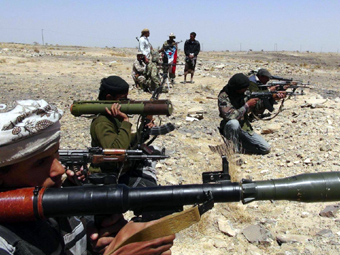
Yemen's Collapse: Will it Impact Oil Prices?
| published March 27, 2015 |
By R. Alan Clanton
Thursday Review editor
Oil prices are continuing to fall worldwide despite the threat of some disruptions on the Arabian Peninsula, as Yemen descends into chaos and civil war, and as a coalition of moderate countries like Saudi Arabia, Kuwait and the United Arab Emirates bombed Houthi rebel and Shiite-led militant positions in several heavily populated areas of Yemen.
Yemen, which has been a hotbed of rebel and terror activity for years, has seen its increasingly violent internal strife escalate dramatically over the last few months, spurring the mass evacuation of U.S. military and diplomatic personnel, and triggering the evacuation of personnel of numerous other countries. The violence forced President Abd-Rabbu Mansour Hadi to flee the capital, then, abandon even has fallback position on the coast. Hadi is rumored to have eventually escaped the onslaught of the rebels by evacuating his entourage by boat.
Rebels and militants now control much of the capital as well as other cities, but violence is spreading quickly as factions within the anti-Hadi movement now quarrel with each other. Saudi Arabia, which shares a long southern border with Yemen, is intervening with heavy military action—including more than one hundred air strikes on a variety of rebel positions. Backed by five other Arab nations, and guided in part by intelligence provided by the U.S. and Britain, Saudi jets and air power from other countries have hit Houthi positions in several cities, but reporters in Yemen say that civilian casualties are high, and collateral damage is extensive.
Energy analysts had originally calculated that the violence in Yemen, which has already drawn in regional powers such as Iran (which backs the Houthi militants) and Saudi Arabia and Jordan (who backed the government of Hadi), will disrupt oil prices by disrupting oil production and supplies. But many oil experts now say that with worldwide reserves continuing to grow—in some places exceeding 80% of all storage capacity—prices will almost certainly inch downward, at least through the start of summer. Production continues to rise in most OPEC countries, and oil and gas production in the U.S. has reached the saturation point for domestic demand.
Although prices briefly spiked earlier in the week, reflecting concerns that Yemen’s own oil production and distribution might be disrupted (and by fears that a wider war by Saudi Arabia would disrupt the supply coming from its own oil fields), most analysts say that Yemen’s civil war will prove to be a minor distraction in the global market. Oil from Saudi Arabia can be transported using other land and sea routes, thus avoiding the dangers posed by Yemen’s proximity to the mouth of the Red Sea. Yemen’s own supplies, while substantial, are only a tiny fraction of what is produced by Saudi Arabia, Kuwait, Iraq and Iran.
Yemen’s descent into chaos may quickly turn into a proxy war as Saudi Arabia seeks to drive rebels and extremist Islamists from Yemen’s largest cities and towns, even as Iran continues to openly back the predominantly Shiite Houthis in their war against the moderate government. Yemen is seen as strategically important for its control of the narrow strait where the Red Sea opens into the Gulf of Aden, and where African countries like Djibouti and Somalia intersect.
But most analysts concede that the complex shifting of alliances could also be affected by the outcome of the nuclear talks between the United States and Iran. A favorable outcome for Iran and U.S. would mean a partial or total lifting of heavy trade embargoes and economic sanctions, and Iran has long dreamed of being able to once again sell its own substantial supplies of oil on a global scale.
Saudi Arabia says it has no plans to reduce its production of oil, even if things get worse along its southern frontier with Yemen. Russia, suffering at the brink of a potentially catastrophic recession, also has little inclination to reduce its production of oil and gas. The Iraqi Army has recaptured several of the largest of its oil refineries and distribution facilities—key operations once in the hands of ISIS militants. And with U.S. reserves hovering near 80%, Iranian oil supplies flowing into what ANZ Bank characterized as “an already saturated market” means there is little incentive for oil prices to climb higher.
Storage capacity factors heavily into oil price fluctuations; with storage capacity running at critically low levels worldwide, some energy analysts say that prices may drop further between now and early summer. U.S. gasoline prices have largely stabilized nationwide, fluctuating only slightly over the last few weeks.
Related Thursday Review articles:
Oil Prices Stumble on Low Storage Capacity; Thursday Review; March 17, 2015.
Oil, Debt, & Venezuela on the Brink; R. Alan Clanton; Thursday Review; January 9, 2015.
